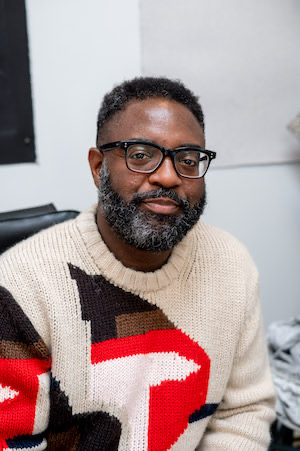Reginald Dwayne Betts was first introduced to poetry when an unknown person slid a copy of Dudley Randall’s The Black Poets under his prison cell door.
Betts had just landed himself in prison at age 16 after a night filled with bad decisions. He joined a friend and a bunch of guys he hardly knew and went looking for trouble. By the end of the night, he had robbed a man at gunpoint at a mall in northern Virginia, taking his wallet and his car.
The Maryland honor student, who was always a prolific writer, was arrested a day later. He was tried as an adult and sentenced to a nine-year prison term, which included time spent in solitary confinement.
“When I first got into prison, I had spent much of my time writing essays, really consuming myself with writing but with no direction or purpose, just writing in my journal. When I get this book slid to me, that moment became really significant,” said Betts in an interview with the Washington Examiner.
Betts said The Black Poets, and the poetry that poured out of him after this exposure, began his path not just to redemption, but also to his current sense of purpose. Today, he works to help other young people attempting to recover from their own poor choices.
Betts explains he didn’t really understand what he was capable of. He was frightened, having never been away from home or his family in his entire life before prison.
“I’m trying to process the world around me, but it’s just jarring,” he said. “So I get this collection of poems, and it introduces me to poetry and what a poem might do, and I just decided to be a poet.”
In his 2010 memoir, A Question of Freedom: A Memoir of Learning, Survival, and Coming of Age in Prison, he reflected on the series of bad decisions that led him to his crime and how embracing his love of words in both books and writing gave him purpose.
Two decades later, Betts is a public defense lawyer working on his doctorate in law at Yale University. He continues to find himself frequently in prison — only this time as a man on a mission to get his “Freedom Reads” program to construct libraries in prisons around the country.

When he left prison after serving eight years, he had already completed his GED diploma. He got a job in a bookstore but said his goals outside of that weren’t what you might conclude. “It would be absurd for me to say my goal was to win a national book award,” he said. “It’s like, ‘Seriously, that’s what you want to do with your life?’ Which is what I set out figuring out.”
Betts went to Warren Wilson College and enrolled in the master’s in fine arts program for writers. He couldn’t get the job he wanted teaching poetry, he said, “so I ended up going to Yale Law School and sort of kicking around. And again, I guess I had goals. But at that point, my goals were typically around having a child and then having another child and being married. Goals at that time was, like, ‘Can we pay our bills?’”
Having finished law school and his memoir, he began presenting on his book in prisons. “I turned my book into a solo show, and I make it available in paperback for free to a bunch of people in prison,” Betts said.
It was at that moment he realized he had the opportunity to chase this big, ambitious project that would change lives. “Putting millions of books in prison,” he said.
“I talked to a bunch of architects,” he said. “I talked to some people who designed libraries, and essentially, what we did was map out this concept of a library that wasn’t just bookshelves on the wall but a space to create community.”
Community is as vital to people in prison to health and purpose as it is to everyone else, Betts said: “Accessing that through a library provides a connectivity for people and dignity while they are able to access resources. It also provides this unique access to freedom.”
The microlibraries created by Freedom Reads are curved, adding a pleasing aesthetic design to the bookshelves. For the curious or supportive, some are now on display at the National Building Museum in Washington, D.C.
“They are modular, and it’s premised on this idea of an arc, thinking about Malcolm X and Martin Luther King saying the arc of the universe is long — ‘The moral universe is long but bends towards justice,’” Betts said.
“So trying to have that kind of arc and structure, and also thinking that there’s not many curves in prison, books are a thing that you could cherish,” he said. “So, I wanted to create a point of tranquility in prison housing units, so they are even more drawn to the possibilities in those books.”
His plan is to have these shelves installed in prisons across the country. Currently, there are a few handcarved shelves that are either installed or in the process of being installed.
“I founded Freedom Reads to bring the beauty, purpose, and freedom that literature can give you, that can empower you, and to help change lives of people in prison,” he said.
It all started with someone — he never saw the person’s face — paying it forward to a terrified teenager looking for a greater purpose.

